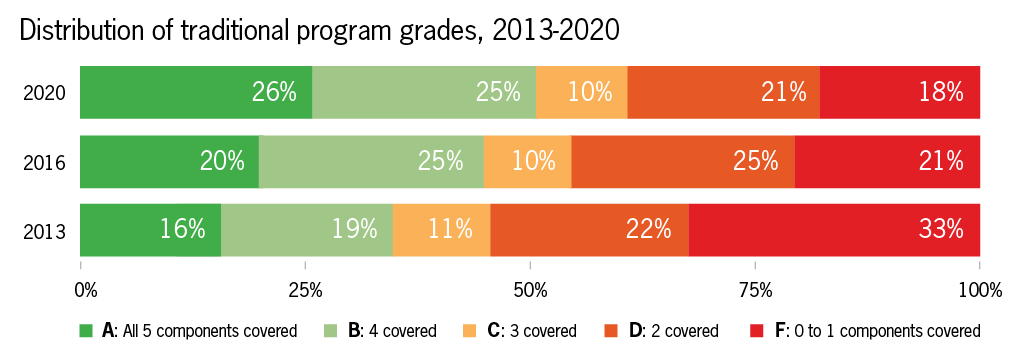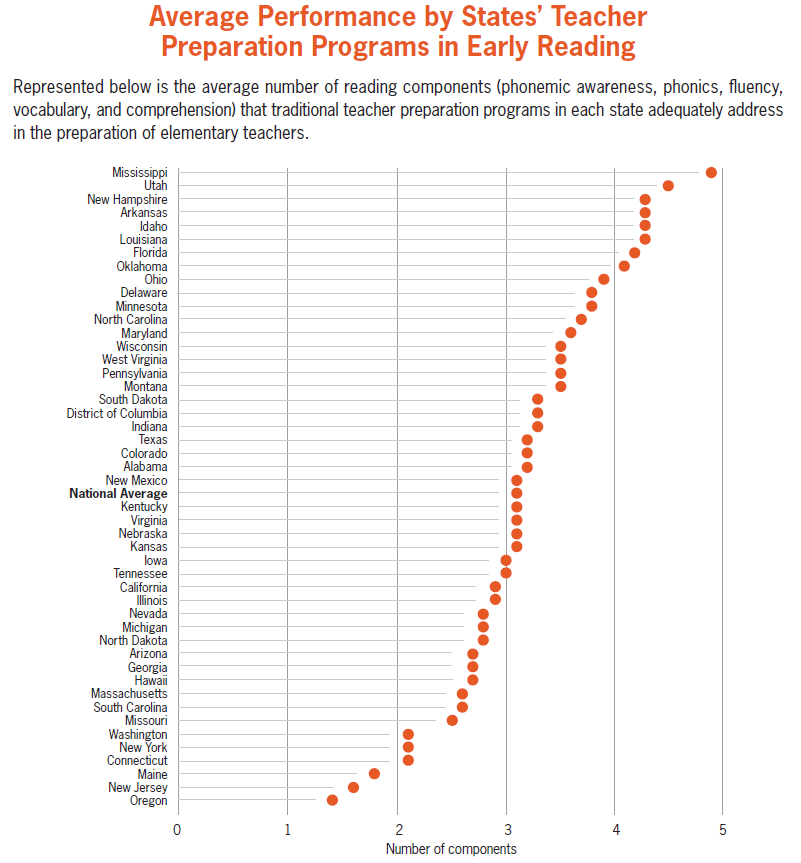
Jan 28, 2020 12:00:00 AM
New data and analysis from the National Council on Teacher Quality finds significant progress on the science of reading instruction in teacher preparation. I had the opportunity to ask Kate Walsh, president of the National Council on Teacher Quality, a few questions about the "Teacher Prep Review" and the science of reading.
1. We know most teacher preparation programs have historically paid too little attention to the key components of the science of reading. What has changed in 2020, if anything?
For the first time since we began publishing ratings (in our 2013 "Teacher Prep Review"), more elementary teacher prep programs are now teaching about the science of reading than not. That’s a milestone of at least some sort. We report that 51% of 1,050 traditional undergraduate and graduate programs now earn an A or B grade for their coverage of the science of reading, up from just 35% seven years ago.
The latest findings are a positive sign for newly energized movement across the nation to bring down notoriously and uniquely high rates of illiteracy in the United States, with a third of all kids never learning how to read. Given the lack of progress by the nation on this front, this news comes as a real shot in the arm. It is also a positive sign for the strategy behind the Teacher Prep Review, as we can now supply clear evidence that our rating system is leading programs to make changes they heretofore been unwilling to make. Ratings, even though no one likes to be rated, work.
While this is all good news, it’s too early to pop the champagne on the reading front. There are still a substantial number of programs (507) that deny that there is a science to teaching reading. Nearly 40% of programs earned a score of D or F. However, now that the issue of America’s reading crisis is getting so much attention (thank you Emily Hanford!), setting off all sorts of activity in many states, we expect the pressure on them to change will be intense. We will continue to do our part.

2. Are there regional differences in where aspiring teachers can find prep programs that will give them a solid grounding in the science of reading?
We found substantial variation in adherence to reading science from state to state, but first, it is important to describe what exactly we look for when a program is analyzed. Our experts look for adequate ‘coverage’ (class time, the quality of the textbooks and teachers demonstrating their knowledge) of each of the five key components of reading science: phonemic awareness, phonics, fluency, vocabulary and comprehension. (Here’s a fun 90-second animated video on our methodology.) This makes it possible for us to report on the average number of components taught by programs in each state.
As this chart shows, we find significant differences among states. Not surprisingly and for the second time in a row, Mississippi—given its uniquely strong performance on the NAEP—tops the list for its programs’ coverage of the five components. Utah, New Hampshire, Arkansas and Idaho are in close company.

3. In the APM documentary, "Hard Words," Mississippi was featured as a leader in transforming teacher prep regarding reading. Do your reviews bear this out?
Absolutely. Last fall, NAEP identified only Mississippi for having significantly improved fourth-grade reading scores. Nearly all of the 12 Mississippi programs we reviewed address each of the five key components. We believe the state’s attention to teacher prep, alongside its investment in additional supports, such as literacy coaches, has been key to its success. As noted, this is the second consecutive edition of the "Teacher Prep Review" in which Mississippi has earned the highest aggregate grade.
Now that said, the folks on the ground fighting the literacy wars in Mississippi have told us that the programs have a long way to go, that there continue to be many weak spots. We don’t want people to think that a high rating on the Review means that teachers are getting all that they should. When we started this exercise 15 years ago (as we did ten pilot studies before launching the full Review in 2013), we had to set a pretty low bar for programs, as even with a low bar, only 17% met the standard. For example, there are programs that teach about the science, but which mention it as only one of many valid approaches. Over the next year, we will be recalibrating our reading standard so that programs that earn an A will have to meet a very high standard indeed.
4. Tell me more about the measures prep programs use to determine whether their students have mastered the elements of the science of reading?
This isn’t a very pretty story….
There are some 36 states which require their candidates to take and pass a test of their reading knowledge. Not bad, right? Supposedly having these tests means that programs will have been forced to teach reading science. However, there are gigantic loopholes though, which make this sensible-sounding accountability system not nearly as effective as it should be.
First of all, only half those 36 states use a test that adequately represents the science of reading. The biggest problems are the tests where reading is only a small part of a much broader test. That means that a teacher can fail all the items on reading science and still do fine on the test.
That leaves 18 states which do have a good, stand-alone licensing test. When we look at programs in those states, we still see many reading courses that are sub-par, which don’t mention a word about reading science. Massachusetts has been a prime example of that, with a great test and almost no adherence by programs. What happens instead is that the professors refuse to change their instruction (unfortunately they often don’t know the reading science well enough to teach it) and instead give teacher candidates a test prep booklet that allows them to cram for the test. That isn’t how we learn, as anyone can tell you. Candidates often have to take the test multiple times before they pass, an expense that falls on the candidate, not the program.
The story gets worse.
Other than California, states have not historically released programs’ reading scores. State education agencies have protected their programs from public scrutiny. That means programs can have 50% first-time pass rates on these tests, but nobody knows about it, particularly the poor candidate who enrolled in a program with a bad track record. NCTQ is working to make these pass rates public, so that programs “own” their scores, as we know happens in other professions like nursing.
Final point. It is with some irony that California is poised to get rid of its strong licensing test, known as the RICA. The pass rate on that test is really good (around 90%—much higher than tests elsewhere), but that fact isn’t being told in the press. The forces against the science of reading should never be underestimated.
5. What do you want aspiring teachers and districts looking to hire teachers who really understand the science of reading to take away from this report?
We all know reading is an essential skill needed to graduate from high school, earn a decent wage and engage as a citizen. Yet, more than one million students are going into their fourth-grade classrooms unable to read each year. And two-thirds are Black and Hispanic children. If this isn’t evidence of institutionalized racism at its worst, I don’t know what is.
What’s most frustrating is that it’s so unnecessary. Research conducted largely under the auspices of the National Institutes of Health over six decades gives us a roadmap for the most effective way to teach reading. If teachers knew this science and schools enabled them to teach it with good assessment tools and texts, we could slash the rate of reading failure from three in 10 children down to at least one in 10, if not lower. If we want to give kids a chance at success in school and in life, they have to learn how to read.
We urge districts to look at our data for two reasons. One, they can use it as the basis for some frank conversations with their university partners, that the district expects any applicant to have this knowledge. I also hope they look to these data to better understand the critical need for providing practicing teachers in their schools with better curricula, assessments and professional development that all reflect the science of reading. We’ll squander any progress made by teacher prep if they don’t.
We would encourage aspiring teachers to use these data as the basis for where they train to become a teacher. Most aspiring teachers would be shocked to know that just 50% of the programs out there will arm them with the knowledge to teach their students to read, the most important job that an elementary teacher has. If that imparts a bit of outrage, that’s entirely appropriate.
Maureen Kelleher is Editorial Director at Future Ed. She was formerly Editorial Partner at Ed Post and is a veteran education reporter, a former high school English teacher, and also the proud mom of an elementary student in Chicago Public Schools. Her work has been published across the education world, from Education Week to the Center for American Progress. Between 1998 and 2006 she was an associate editor at Catalyst Chicago, the go-to magazine covering Chicago’s public schools. There, her reporting won awards from the Annie E. Casey Foundation, the International Reading Association and the Society for Professional Journalists.
Few issues in education spark more tension and debate than standardized testing. Are they a tool for equity or a burden on students? A necessary check on school systems or a flawed measure of...
Charter schools are public schools with a purpose. Operating independently from traditional school districts, they're tuition-free, open to all students, and publicly funded—but with more flexibility...
Despite the benefits of a diverse teaching force, prospective teachers of color fall out of our leaky preparation pipeline at every stage: preparation, hiring, induction, and retention. Here’s what...
Ed Post is the flagship website platform of brightbeam, a 501(c3) network of education activists and influencers demanding a better education and a brighter future for every child.
© 2020-2025 brightbeam. All rights reserved.
Leave a Comment